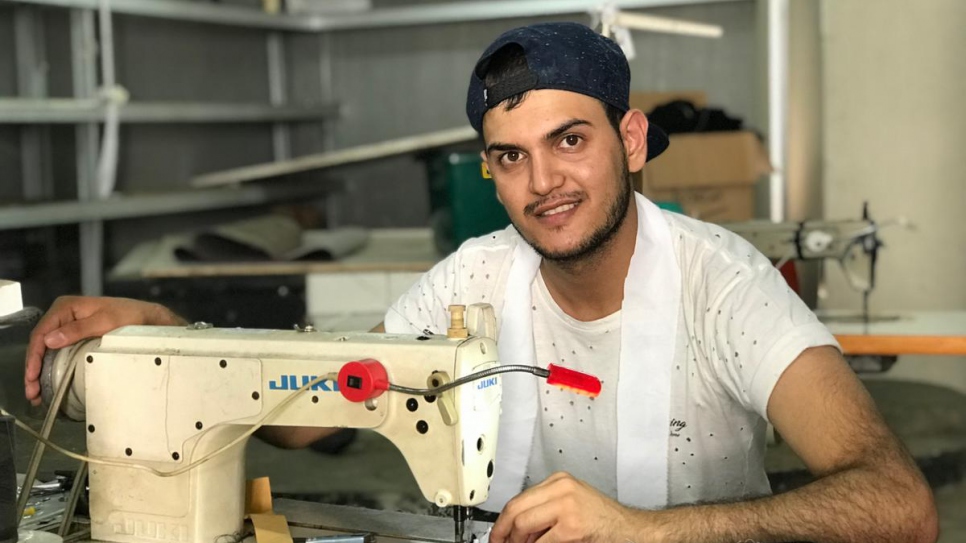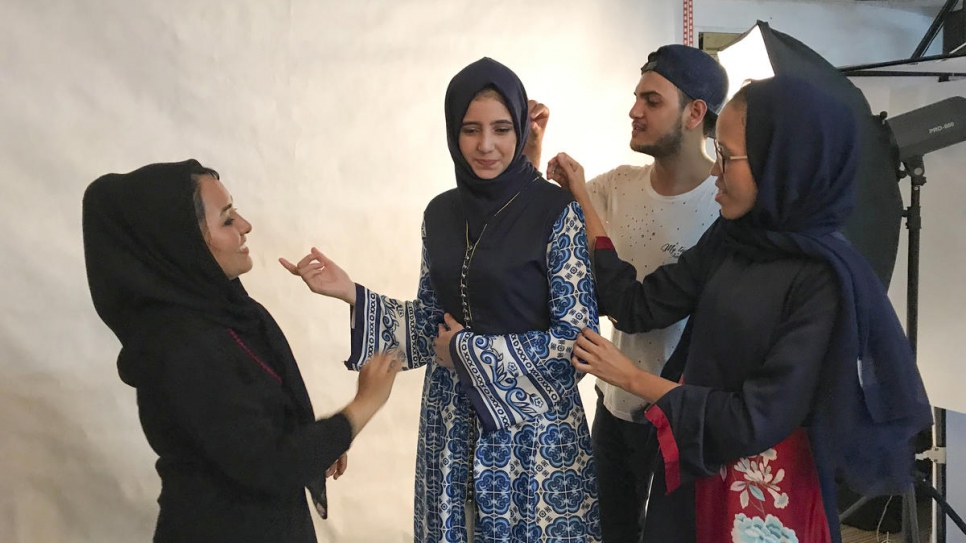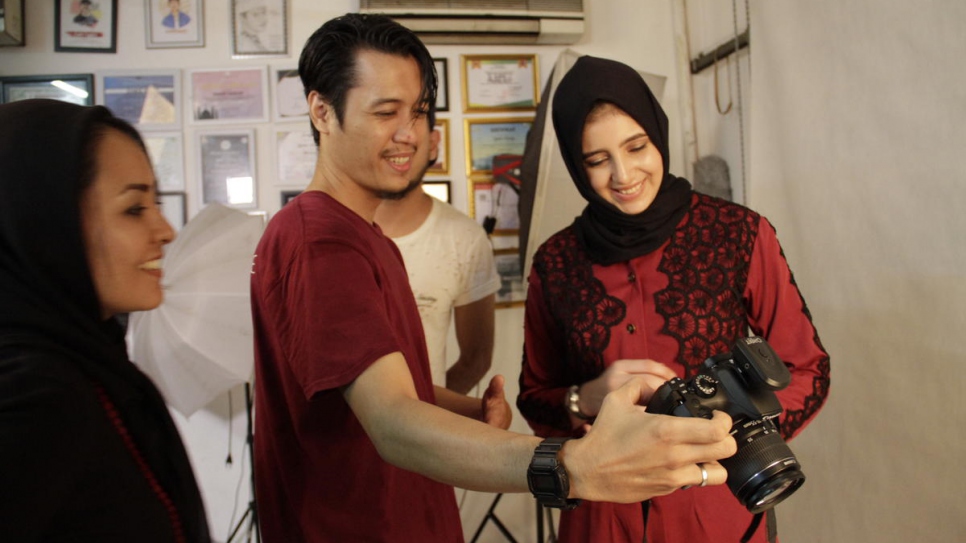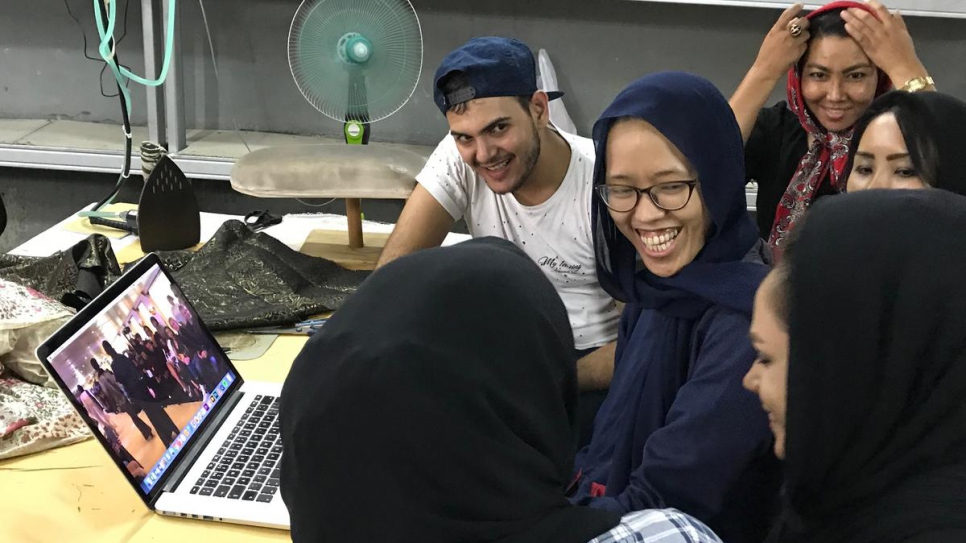Refugees get a chance to start over in style in Jakarta
An Indonesian fashion entrepreneur's project to provide training and empower refugees aims to create new opportunities.
Afghan refugee Khatira Mahmudi, 24, is one of the trainees taking part in the Benang project in Jakarta, Indonesia.
© UNHCR/Caroline Gluck
Models strut up and down a catwalk on a boat on the Seine river in the French capital, Paris, to upbeat music as buyers and journalists look on amidst the flashing cameras.
Watching a video of the show thousands of miles away on a computer in a sewing workshop in Jakarta, the Indonesian capital, a group of Afghan refugees sit mesmerised. Some have worked on outfits and created clutch bags for the show. It is a moment they realise that they can dream big – and have a global platform for their work.
“I’m really happy to see this,” said 24-year-old mother of two, Khatira Mahmudi, an Afghan refugee who has lived in Indonesia for the past three years. “I will do my best for the future, to be successful,” she said, her face lit up with excitement. “I’d like to make a fashion show for myself. It’s my dream!”
The project to give refugees experience in couture is the brainchild of Indonesia-born fashion entrepreneur Franka Soeria, a co-founder of Modest Fashion Week, which showcases longer, looser styles for women in several cities around the world. She also has her own brand, Markamarie.com, a creative fashion agency as well as working as a global consultant for other international brands.
“We hope we can stitch those two components together – the society and refugees."
Spotting an opportunity, Soeria started what she calls the Benang Project in September, providing fashion training for six refugees. It includes design, pattern making, tailoring, creating a brand, holding photo shoots and fashion shows to help them integrate into Indonesian society.
“Benang means thread,” she explained. “We hope we can stitch those two components together – the society and refugees – so it will become unity. Together, we can create something big.”
The designer has already extended a helping hand to young Indonesian designers and people with disabilities. But after a meeting with UNHCR, the UN Refugee Agency, in Jakarta – and hearing about the problems facing urban refugees – she wanted to do more to help.
Cities like Jakarta are playing a growing role in refugee inclusion. Of the world’s 25.4 million refugees, around 60 per cent live out of camps and in cities and urban areas across Asia, the Americas, Europe, the Middle East and Africa.
Mayors, local authorities, social enterprises and citizen groups in these Cities of Light - from Sao Paulo to Vienna, Erbil and Kigali - are on the frontlines of the global refugee response, fostering social cohesion, and protecting and assisting the forcibly displaced in their midst.
In addition to Soeria, Jakarta-based entrepreneurs such as the Gourmand Group restaurant chain and nonprofits such as Art for Refuge, Indonesia for Refugees and The Learning Farm also provide training to help refugees develop livelihood skills in cuisine, art, soap making, sewing and organic farming.
Supported by the Jakarta City Government, around 50 refugee children are also learning to speak Bahasa, the official Indonesian language. They can access national elementary schools in the capital, with additional backing from UNHCR partners, Dompet Dhuafa, Catholic Relief Service and PKPU Human Initiative.
“We need to find ways to help refugees take care of themselves and give back to host communities."
The training opportunities on offer are a lifeline for refugees. Less than 14,000 refugees, about half of them from Afghanistan, are living in Indonesia – one of the world’s most populous countries. While the country is generously hosting these refugees until longer-term solutions can be identified, they do not have the legal right to work, and it is difficult for them to attend university.
With resettlement opportunities dwindling and overall funding becoming increasingly unpredictable, UNHCR is looking at new ways to support refugees in Indonesia be more self-sufficient and ready to seize the moment.
“We are trying to prepare refugees for the future,” said Thomas Vargas, UNHCR Representative in Indonesia. “We need to find ways to help them take care of themselves and give back to host communities, sharing the skills and knowledge they have. That can also encourage economic development that will help everyone.”
He added: “When refugees can improve their skills they improve their chances to rebuild lives wherever they are – including if they are resettled.”
"They gave me the key, so I can open the door and my dreams can come true.”
Already, the positive impact the project has had on the lives of the selected trainees is clear. Ahmad Musawer Faizi, 21, fled Afghanistan back in 2015, arriving in Indonesia alone. He learnt to sew as a young boy, watching his mother make clothes at home, and also attended a short fashion course supported by UNHCR at Jakarta’s fashion school, Esmod.
“I love fashion design,” Ahmad said. “We can come here, make something for ourselves, improve our skills. I’m happy because I’m busy with this project. I don’t have time to think about negative things; I’m busy thinking about positive things.”
“Now I feel I can improve my skills … They gave me the key, so I can open the door and my dreams can come true!” he added.
The passion the trainees have for their work is evident both from the intense attention they give to their designs at the workshop to their excitement at attending their first-ever photo shoot, also using a refugee model and refugee make-up artist.
While the project began small-scale, Soeria hopes to expand it – and maybe even encourage other business leaders to look at similar skills training opportunities. “Maybe…this idea can have a snowball effect. Maybe more people will join and we can help more people,” she said.
She also believes that the energy and enthusiasm refugees in the Benang project have demonstrated, as well as their “can-do” mentality, is something she and other Indonesians can also learn from.
“What we learn is their fire to do something,” Soeria said. “This…can inspire other Indonesian people. We shouldn’t take it for granted. It’s very inspiring to see the fire inside them to be successful – and I know they will be.”
With additional reporting by Mitra Suryono





